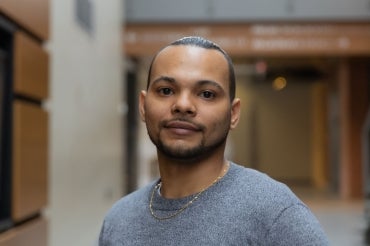From the oil sands to politics: New grad Eli Rose aims to use his voice to empower others

Eli Rose says his undergraduate experience taught him how to articulate his ideas as an advocate (photo by Shayla Anderson)
Published: June 20, 2023
Eli Rose has a reputation for asking challenging questions – and he intends to continue asking them, as an advocate for those who cannot.
A longtime mentor and community organizer, Rose – a member of Innis College – graduates this week from the University of Toronto with a degree in political science.
As he leaves the undergraduate life and prepares for graduate school, Rose spoke with Faculty of Arts & Science writer Cynthia Macdonald about how his many leadership activities have prepared him for his ultimate ambition: a career in politics.
How did you come to study at the University of Toronto?
I had a full life before coming to U of T, having graduated from college with a marketing diploma. I worked in the oil fields of Alberta, then went back to school for another certificate. But it was always my dream to go to U of T. When my mom’s sister, to whom I was close, passed in 2018, I decided to dedicate the next part of my journey to honouring her.
You’re going to do a master’s degree in political science in the fall. Why did you decide on that field?
I have my own political aspirations, actually! Being in government has always seemed very interesting to me. I grew up in Malvern, in the northeastern part of Toronto. It’s a part of the city with many issues such as street violence and a lack of essential services. I was advocating for solutions to problems like that even before I knew that I could be an advocate professionally. I was already thinking about different ways to make life a little more just for people there, supporting communities that needed a bit more help.
But it wasn’t until I came to university that everything came together. I started to see who I am and what I wanted to do – the kind of change and impact I’d be able to create.
You’re the winner of a student leadership award and you’ve improved the student experience at your college and beyond. What initiatives did you participate in?
I first got involved with the Association of Political Science Students. That led me to get involved with the undergraduate chapter of Black Future Lawyers, where I was vice-president of finance and helped the founder recruit the rest of the board.
But where things really took off for me was when I became a student mentor at Innis College at the tail end of my second year. I helped with training and offered support. I met a lot of good people and found I was able to empower others, especially first-year students. From there, I started building relationships and worked on the Innovation Hub to help redefine the student experience.
All these experiences gave me the confidence and the courage to go after things I wanted, or even just to voice my opinion. One of my ideas was to create an identity matching system for mentors: aligning students with mentors who matched their backgrounds and interests. I was also one of the first two Black orientation coordinators and was on the working group of the Black Student Experience at Innis, making a point of ensuring that the group would be sustainable after its founders had graduated.
You seem to have a real focus on empathy, identity and the empowerment of individuals, whether at school, work or elsewhere.
I think that comes from my own experience of feeling undervalued – showing up to the workplace in a way where I’m not bringing my true self. There’s a lot of overlap between my working world and my academic world – it’s just different language.
As a young teenager growing up in my neighbourhood, I saw how power dynamics could negatively affect my friends. Now that I’ve gone through university, I’ve been able to better articulate and visualize ideas in order to find solutions.
Why have you decided to pursue a future in politics?
My senior thesis really changed me. I chose to research political career structures – in particular, how identity conditions people’s lived experiences and careers. Working on that gave me the clarity to proceed with where I’m going next.
We’re in an era of political mistrust and multiple truths – and that’s a barrier for those who might consider a career in politics. But if you really want to effect change, the political arena is the best place to do that. We elect people to represent us, and those are the people making the decisions. Why wouldn’t I want to have a seat at the table, especially to act for those who haven’t been represented?
Opening myself up to criticism will be difficult – but that’s okay, because I’m coming at public service from a space of truth and care and support. And I want to use my experiences – as a mentor, as a team lead, as a facilitator of discussions around identity – to help empower others and give them a voice. And this is the way I know how to do it.



